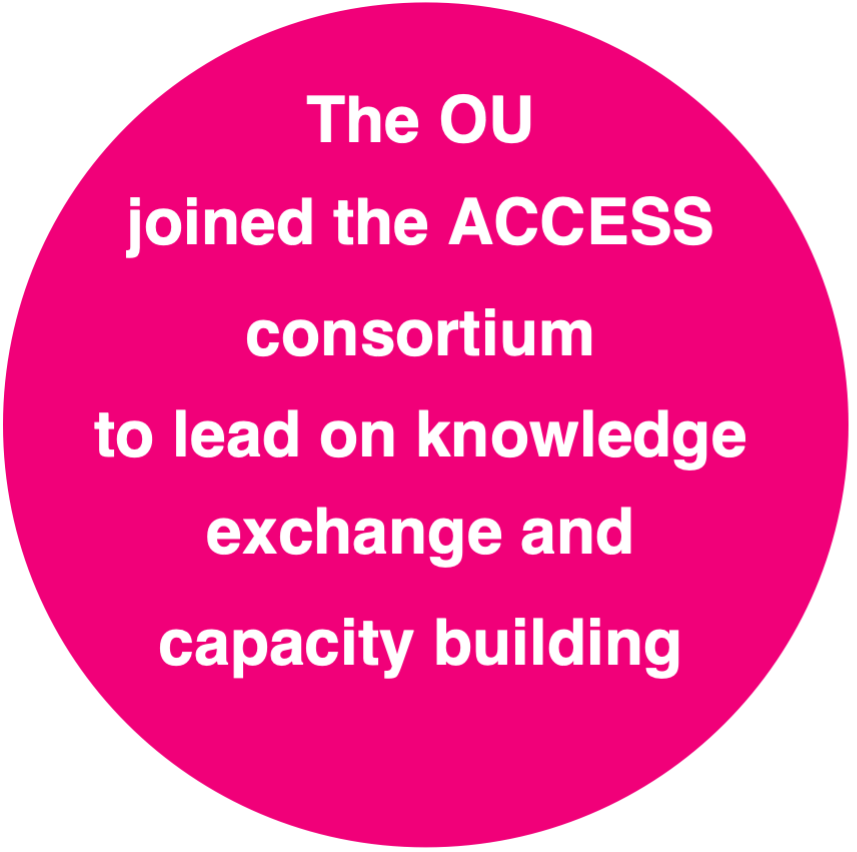
You are here
- Home
- Research
- Projects
- ACCESS - Approaches in Complex and Challenging Environments for Sustainable SRHR
ACCESS - Approaches in Complex and Challenging Environments for Sustainable SRHR
How do you advance global equality in sexual and reproductive health?
Read how the OU is working to help people in the world’s most marginalised communities access services they need
The challenge
Our world is increasingly affected by natural disasters, prolonged conflict, economic and political crises and disease outbreaks such as Covid-19. All of these can prevent people from gaining access to essential services such as healthcare.
There any many complex and interconnected barriers that prevent universal access to sexual and reproductive health and rights (SRHR), especially in countries with the lowest levels of development, and among minority populations in the poorest and most marginalised communities.
The unfinished agenda is large, yet the rapid pace of technological change, the health, education and economic gains of the past 20 years, and the renewal of global development goals gives hope that progress in achieving universal access to sexual and reproductive health and rights is possible
Guttmacher-Lancet Commission on Sexual and Reproductive Health and Rights 2018
Everyone deserves the same sexual and reproductive health and rights. Achieving this means empowering everyone to access the services they need, and to make their own sexual and reproductive choices.
In practice, this means providing access to safe abortion; supporting the prevention, care and treatment of Sexually Transmitted Infections; providing information, education and counselling on sex, relationships and reproductive health; and tackling social taboos wherever they prevent global SRHR equality.
Ensuring that all people are able to enjoy the same sexual and reproductive health and rights requires progress on reaching the most under-served and marginalised populations. Our research addresses this challenge and we aim to make progress on reaching those populations and to make a contribution towards meeting the United Nations’ Sustainable Development Goals for 2030, particularly in achieving good health and well-being (SDG 3), gender equality (SDG 5) and reduced inequality for all (SDG 10).

The OU's response to this challenge
To address this challenge, co-ordinated efforts by consortia with provider, advocacy and research experience are necessary, so the OU joined a consortium called ACCESS (Approaches in Complex and Challenging Environments for Sustainable SRHR) funded by UK aid from the British People, led by the International Planned Parenthood Federation (IPPF). In this consortium, the OU works alongside Frontline AIDS, Internews, the London School of Hygiene & Tropical Medicine and the Women’s Refugee Commission.

While each organisation has a distinct area of expertise, we are united by a shared commitment to improving the lives of the most marginalised populations, and we share core principles and values that are vital for ensuring sustainable SRHR solutions at scale.
The ACCESS approach and the Open University’s role
 The ACCESS consortium adopted a number of core principles and approaches judged to be vital for ensuring sustainable SRHR solutions at scale. The principles are that projects should be working towards gender transformation and de-colonisation. The approaches that follow through from these principles are:
The ACCESS consortium adopted a number of core principles and approaches judged to be vital for ensuring sustainable SRHR solutions at scale. The principles are that projects should be working towards gender transformation and de-colonisation. The approaches that follow through from these principles are:
- participation
- co-creation and
- community leadership of projects.
ACCESS began its preparatory work in February 2019 and moved into the implementation phase in January 2021. The project was expected to run until December 2023 but in April 2021 funding was terminated as part of the UK’s government’s decision to reduce is foreign aid budget from 0.7 to 0.5 of Gross Domestic Product (GDP).
Blogs and resources
To date we have produced the following global goods:
- Principles into practice: Co-creation of learning in complex and challenging environments. Discussion guide and toolkit
- Take your training online, a new course available for free and designed to support trainers working for charities and NGOs to move their face-to-face training online or improve the online training they already offer.
- Three linked article discussions of Comprehensive Sexuality Education (CSE):
- Full review: Effective CSE
- Colonial Conundrums: What happens when a global north-based Sexual Reproductive Health and Rights (SRHR) consortium attempts to adopt a decolonising approach?
- A new online version of the Frontline Aids human rights documentation and monitoring system training known as REAct: OLCreate: REAct_1.0 REAct (Rights - Evidence - Action): Implementing a human rights documentation and monitoring system (open.edu)
- Taking a pleasure-based approach to Comprehensive Sexuality Education (CSE) In addition to the FCDO funded work under ACCESS, the Open University with IPPF and the Family Planning Association of India (FPAI) previously collaborated on the development of this short online course available for free.
What we aim to achieve
 Whilst the initial funding for ACCESS has come to an end, the OU remains committed to working with marginalised communities to improve their sexual and reproductive health rights. Drawing inspiration from the ACCESS approach we will collaborate with consortium partners to seek alternative funding to continue this work. With the support of institutional research funding, we are continuing to work in the following areas with partners in both Uganda and Nepal:
Whilst the initial funding for ACCESS has come to an end, the OU remains committed to working with marginalised communities to improve their sexual and reproductive health rights. Drawing inspiration from the ACCESS approach we will collaborate with consortium partners to seek alternative funding to continue this work. With the support of institutional research funding, we are continuing to work in the following areas with partners in both Uganda and Nepal:
- Human Rights Approaches (HRA) to Health in Global Development Settings: Developing the Evidence Base
- Developing contextually-sensitive Comprehensive Sexuality Education (CSE) for out-of-school adolescents in refugee settings
- Creating Self-Care Medical Abortion resources
If you have any comments or questions, please contact CSGD@open.ac.uk